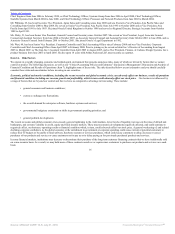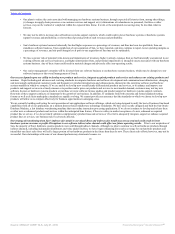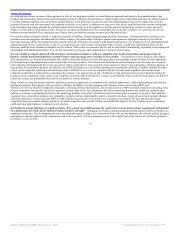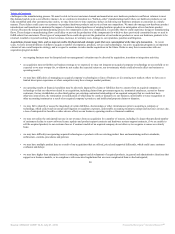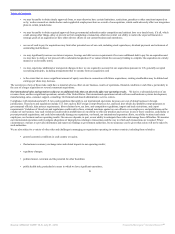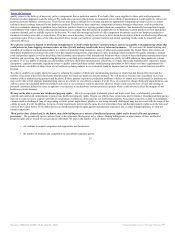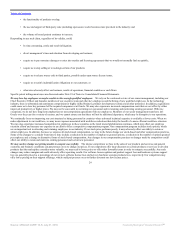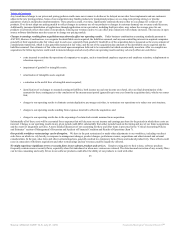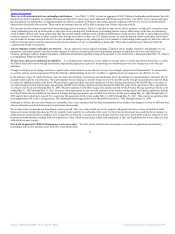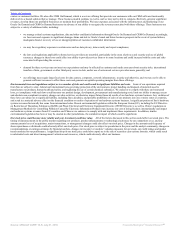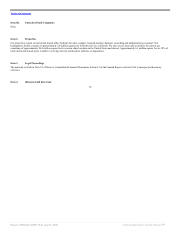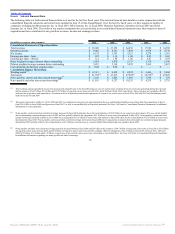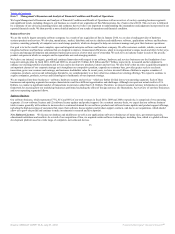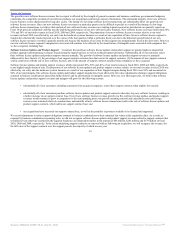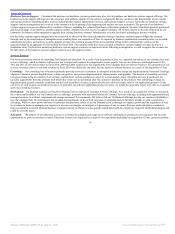Oracle 2009 Annual Report Download - page 30
Download and view the complete annual report
Please find page 30 of the 2009 Oracle annual report below. You can navigate through the pages in the report by either clicking on the pages listed below, or by using the keyword search tool below to find specific information within the annual report.
Table of Contents
hardware or software products, could delay the development or release of new products or new versions of products and could adversely affect market
acceptance of our products. If we experience errors or delays in releasing new software products or new versions of software products, we could lose revenues. In
addition, we run our own business operations, Oracle On Demand and other outsourcing services, support and consulting services, on our products and networks
and any security flaws, if exploited, could affect our ability to conduct internal business operations. End users, who rely on our software products and services for
applications that are critical to their businesses, may have a greater sensitivity to product errors and security vulnerabilities than customers for software products
generally. Software product errors and security flaws in our products or services could expose us to product liability, performance and/or warranty claims as well
as harm our reputation, which could impact our future sales of products and services. In addition, we may be legally required to publicly report security breaches
of our services, which could adversely impact future business prospects for those services.
We may not receive significant revenues from our current research and development efforts for several years, if at all. Developing and localizing software
and hardware products is expensive, and the investment in product development often involves a long return on investment cycle. We have made and expect to
continue to make significant investments in research and development and related product opportunities. Accelerated product introductions and short product life
cycles require high levels of expenditures for research and development that could adversely affect our operating results if not offset by revenue increases. We
believe that we must continue to dedicate a significant amount of resources to our research and development efforts to maintain our competitive position.
However, we do not expect to receive significant revenues from these investments for several years, if at all.
Our sales to government clients subject us to risks including early termination, audits, investigations, sanctions and penalties. We derive revenues from
contracts with the U.S. government, state and local governments and their respective agencies, which may terminate most of these contracts at any time, without
cause. There is increased pressure for governments and their agencies, both domestically and internationally, to reduce spending. Our federal government
contracts are subject to the approval of appropriations being made by the U.S. Congress to fund the expenditures under these contracts. Similarly, our contracts at
the state and local levels are subject to government funding authorizations. Additionally, government contracts are generally subject to audits and investigations
which could result in various civil and criminal penalties and administrative sanctions, including termination of contracts, refund of a portion of fees received,
forfeiture of profits, suspension of payments, fines and suspensions or debarment from future government business.
We may face numerous risks in connection with our strategic alliance with Fujitsu. Prior to our acquisition of Sun, Sun had entered into a number of
agreements with Fujitsu Limited with respect to collaborative sales and marketing efforts and the joint development and manufacturing of Sun’s server products
known as the Advanced Product Line and branded as the Sun SPARC Enterprise line of servers. The agreements contemplate that Sun and Fujitsu dedicate
substantial financial and human resources to this relationship. As a result, the future performance of our hardware systems business may be impacted by the
success or failure of this relationship.
If we, as successors to Sun, fail to satisfy certain development or supply obligations under the agreements, or if we otherwise violate the terms of the agreements,
we may be subject to contractual or legal penalties. Further, if Fujitsu encounters potential problems in its business, such as intellectual property infringement
claims, supply difficulties, or difficulties in meeting development milestones or financial challenges, these problems could impact our strategic relationship with
Fujitsu and could result in a material adverse effect on our hardware systems business. There can be no assurance that the strategic relationship with Fujitsu will
be successful, or that the economic terms of the agreements establishing the relationship will ultimately prove to be favorable to us. The occurrence of any of
these risks could have a material adverse effect on our hardware systems business.
Business disruptions could affect our operating results. A significant portion of our research and development activities and certain other critical business
operations are concentrated in a few geographic areas. We are a highly automated business and a disruption or failure of our systems could cause delays in
completing sales and providing services, including some of our On Demand offerings. A major earthquake, fire or other catastrophic event that results in the
destruction or disruption of any of our critical business or information technology systems could severely affect our ability to conduct normal business operations
and, as a result, our future operating results could be materially and adversely affected.
26
Source: ORACLE CORP, 10-K, July 01, 2010 Powered by Morningstar® Document Research℠


